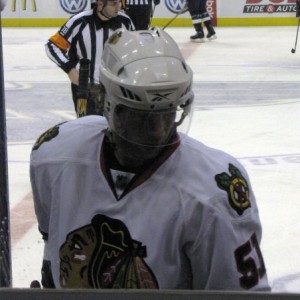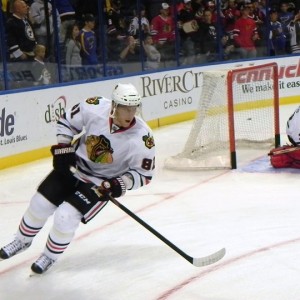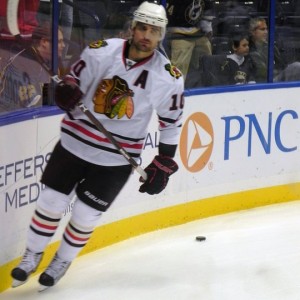Jim Neveau, THW Reporter-at-Large
The defending Stanley Cup champions have certainly had a crazy ride during the past five months. They won their first title in nearly 50 years in June, and followed that up with a cap crunching series of roster moves that saw them gut the depth that had led them to that historic victory.
When the season began, the Hawks faced a whole new set of challenges as they struggled to find harmony and chemistry with a roster full of new faces and youthful inexperience. They had to play a very tough set of games to open the year, and they played them all within a very condensed period of time. This combination of learning on the fly and lack of practice time really seemed to hurt the Hawks, who look disjointed on offense and fundamentally inept on the defensive side of the puck.

Even with all of those hurdles to overcome, the Hawks have also been hit hard by the injury bug in the early going. Marian Hossa has already missed time after a hot start, and Dave Bolland also made his way onto the injured reserve list. Add to that Brian Campbell missing the first month of the season, and you have a recipe for a rough slog through the early part of the champs’ schedule.
The question after the first 15 games is this: with all of the issues surrounding the Hawks, and with all of the pressure that comes with being the defending league champion, can Chicago turn it around with some patience, or should the team hit the panic button and make wholesale changes?
Before we get to answering that question, it would probably be beneficial to explore some of the areas where the team has been faltering, and to get into specifics about how difficult it will be to fix each individual problem.
Problem #1: Chicago’s Shots Against Average Is Through the Roof
Last season when they won the Stanley Cup, the Hawks were the runaway winner in terms of fewest shots allowed per game, only letting an average of 25.1 shots per game find their way on net. This was done with an effective combination of solid defensive play, aggressive back-checking, and a ton of blocked shots courtesy of guys like Brent Sopel and Niklas Hjalmarsson.
This season, the Hawks have been struggling mightily in keeping pucks from making their way to new goaltender Marty Turco. While he has done an admirable job most of the time in keeping his composure while things go crazy around him, the fact remains that the team is allowing six shots more per contest than they did last season, ranking them 19th in the NHL. It shouldn’t come as a surprise that the team that is allowing the fewest shots (St. Louis with 25.7) is also the first place team in the Western Conference.

What are the reasons for this sudden increase? Of course, the loss of Sopel has hurt the team, but perhaps the bigger issue is that the Hawks haven’t been able to defend the puck as well because of some really poor play by their third defensive pairing. Whether it is Jordan Hendry, Jassen Cullimore, John Scott, or Nick Boynton, the third line has essentially served as a raised toll booth arm for rushing teams, and it has cost the Hawks a lot of goals in the early going.
In response to the lack of depth issue the team was confronted with in the absence of Brian Campbell, head coach Joel Quenneville has been giving his main defensive duo a lot more minutes to compensate. Duncan Keith is averaging 29:04 of ice time per game, an increase of over two and a half minutes per contest. While an increase of only two and a half minutes may not seem like a lot, the reality remains that Duncan has been having to do a lot more work both because of the increased payload, but also because of less aggressive back-checking by the forwards, and that has put more onus on the Norris Trophy winner to carry the defensive weight of the team.
Having Brian back will certainly help matters for the Blackhawks, but the only solution to this problem is going to be finding the right combination of guys on the third defensive pairing so that Quenneville isn’t so reliant on his top tier guys for help. Whether this help is going to come by way of a trade or a call up from Rockford, it is something that Chicago is going to have to rein in if it has any illusions about starting a turnaround in the near future.
Problem #2: Offensive Consistency Has Been an Elusive Beast
Perhaps second only to his legendary facial hair, Quenneville’s most talked about quality is his penchant for frequently switching up line combinations. Whether it is wholesale changes coming after a tough defeat, or even remaking the lines on the fly during a game, Joel is never hesitant to pull the trigger on various changes, and he has shown to be particularly quick to do that this season.

Another problem for this offense is that it has mainly been coming off of the sticks of two players: Marian Hossa and Patrick Sharp. While there are times when any team is going to be carried by their offensive stalwarts, Hossa and Sharp have been doing more than carrying the team: they have been the team. Since Hossa went down, the team has suffered, and no one has really stepped up to the plate.
During the pre-season, one strength that was pointed to when discussing the Hawks’ depleted roster was that they were able to keep their core of stars intact. Youngsters like Patrick Kane and Jonathan Toews were expected to help shoulder the offense, and to a large degree, they have been letdowns in the early going. Kane looks lost on the ice with startling frequency, and while he does have 12 points in 14 games, he has been more of a liability than an asset to the club. Toews hasn’t been fared well either, as the historically slow starter has three goals and seven assists in the early going.
Two things are going to have to happen in order for the Hawks to recover some of their offensive magic. The first action that needs to be taken is for Quenneville to stop making his multitude of moves every single game. While there is a certain logic behind changing things up if they aren’t working, there is also such a thing as making moves just for the sake of making moves.
Yes, it does seem a bit like asking a fish not to swim around so much to ask that Quenneville scale back the tinkering, but he honestly does need to give some of these lines time to gel a bit. Getting back a healthy Hossa in a few days will help with that, but the impatient Quenneville still needs to take a chill pill when it comes to line changes nonetheless.
The other change that has to happen is that Kane needs to be a lot more aggressive with the puck than he has been. Ever since he missed a game with the flu earlier this season, Patrick has looked very tentative on the ice, and he hasn’t asserted himself like the confident 21 year old that flew through last season’s playoffs. He has shown flashes of that gravitas lately, but he will need to do it a lot more frequently if he is going to be the impact player that the Hawks intended him to be when they signed him to a lucrative extension last season.
Is it Time to Panic or Time to be Patient?
The issues facing this Blackhawks squad are many, but as has been revealed in these previous sections, a lot of issues have very rational explanations as to why they are happening. Whether it is a lack of chemistry, injuries, or fundamental sloppiness, the keys to fixing all of these issues is relatively black and white.
That being said, the road doesn’t get much easier for the champs. Eight of the team’s next 11 games will be played on the road, including their always difficult circus trip that begins on November 17th against the Edmonton Oilers. That trip is going to tell us a lot about the state of the team, and by the time the final game of the journey ends against the Kings on November 27th, we’re going to have a lot better idea about whether this team is going to be relevant in the Western Conference standings.
Is it time to hit the panic button yet for the Hawks? No, but the direction of this team certainly needs to change if patience will continue to be the answer.